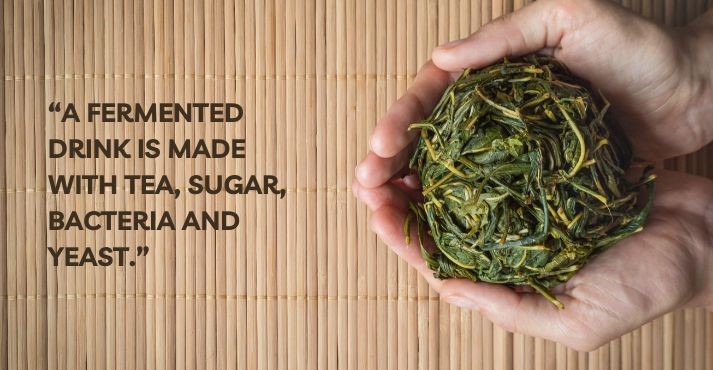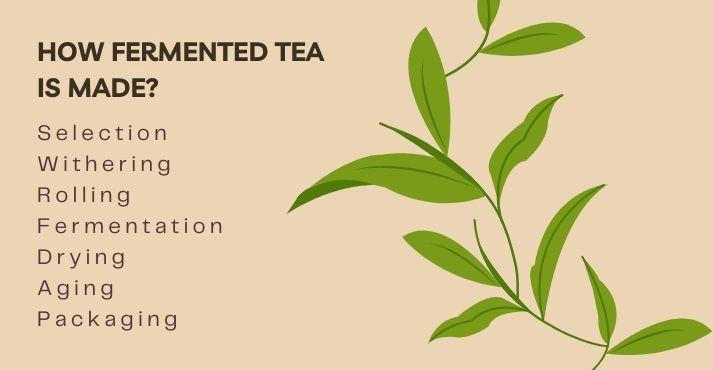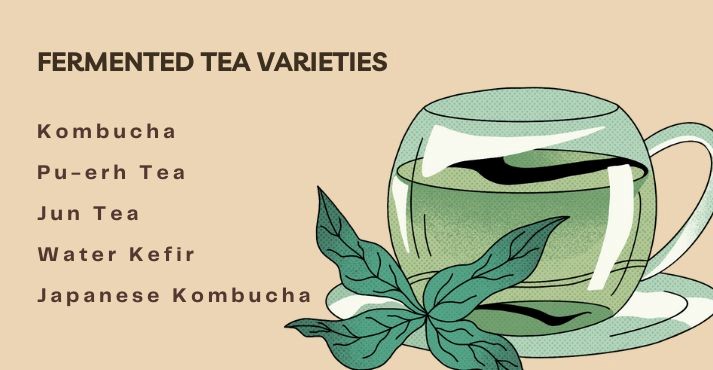Fermenting tea has been a common practice in many cultures for thousands of years.
Not only does it have health benefits, but it’s also rich in probiotics. Fermented tea, such as kombucha and pu-erh, is gaining immense popularity for its unique flavors and potential health benefits.
According to Research and Markets, the global fermented tea market size is expected to reach $9.2 billion by 2027, rising at a market growth of 14.7% CAGR during the forecast period.
But do you know what fermented tea is? With age-old ties to immunity and gut health, it is more than just a trendy drink.
This blog post will explore fermented tea and its health benefits.
What is Fermented Tea?

Fermented tea, like kombucha and pu-erh, undergoes a microbial transformation of tea leaves using bacteria and yeast. Unlike traditional tea oxidation, which exposes leaves to air, fermentation occurs in a controlled environment.
This process imparts the tea’s unique flavors, textures, and potential health benefits. It differs from oxidation, which is characteristic of oolong and black teas, as it involves microorganisms breaking down compounds.
The result is a distinctively tangy and effervescent beverage known for its complex taste profile and potential probiotic properties. The aroma can range from floral to fruity and malty, based on the duration of roasting and the degree of fermentation.
Fermentation influences tea characteristics by promoting the activity of microorganisms on tea leaves. This process alters chemical compounds, introducing unique aromas and textures.
The breakdown of polyphenols and other compounds during fermentation contributes to the distinct profiles of fermented teas like kombucha and pu-erh.
Moreover, the trends in the tea sector represent a growing demand for fermented tea among consumers.
How is Fermented Tea Made?

Fermentation involves microbial activity, which causes tea leaves to break down and decompose over time.
Now, let’s explore how tea is fermented.
- Selection of tea leaves: High-quality tea leaves, often from the Camellia sinensis plant, are carefully chosen.
- Withering: The leaves are withered, reducing moisture content and preparing them for further processing.
- Rolling: The withered leaves are rolled to break cell walls, initiating enzymatic reactions.
- Fermentation: Unlike traditional oxidation, fermentation takes place in a controlled environment. Microorganisms like bacteria and yeast are introduced, transforming the chemical composition of the leaves.
- Drying: The fermented leaves are dried to halt fermentation and preserve desired flavors.
- Aging: Some fermented teas, like pu-erh, undergo additional aging, enhancing flavors and textures.
- Packaging: The finished fermented tea is packaged for distribution and consumption.
Bacteria, such as Acetobacter and Gluconobacter, convert alcohol produced by yeast into organic acids, imparting tanginess.
Meanwhile, yeast, Saccharomyces, ferments sugars in tea, generating alcohol and carbon dioxide.
This dynamic interplay alters polyphenols, amino acids, and other compounds, giving rise to fermented teas’ unique flavors and aromas like kombucha and pu-erh.
Types of Fermented Tea

Fermentation can be natural or accelerated, but it’s always done in controlled environments or under specific conditions. Fermented tea can be found in a variety of flavors and aromas.
The most popular types of fermented tea are:
- Kombucha: Kombucha is a tangy, effervescent tea fermented with a symbiotic culture of bacteria and yeast, offering a probiotic-rich refreshment.
- Pu-erh Tea is a popular Chinese fermented tea that undergoes microbial transformation, aging gracefully to develop deep, earthy flavors and potential health benefits.
- Jun Tea: Jun tea is a honey-sweetened variation of kombucha, fermented with a different culture, yielding a smoother, delicately flavored beverage.
- Water Kefir: Water kefir, a non-tea-based option, involves fermenting sugary water with kefir grains, producing a mildly effervescent and probiotic drink.
- Japanese Kombucha (J-Kombucha): J-Kombuch is a specialty tea, distinct from traditional kombucha, which often involves green tea fermentation, resulting in a nuanced blend of Japanese tea culture and fermentation’s effervescence.
Fermented tea alcohol is another thing. Kombucha is a sweetened, fizzy, fermented, and slightly alcoholic beverage made from Black, Green, White, or Oolong Tea. As for the specific fermented tea alcohol content’s strength varies from 0.5% to 2%. In other words, not too strong.
Fermented Tea Health Benefits
As consumers seek diverse and health-conscious drink options, fermented teas have become trendy, blending tradition with modern wellness trends. Consuming fermented tea, like kombucha or pu-erh, offers potential health benefits.
Some of them include:
- Improves digestive health: Fermented tea, rich in probiotics, supports a healthy gut microbiome, helping digestion and nutrient absorption and potentially alleviating issues like bloating and irritable bowel syndrome.
- Boosts immune system: Probiotics in fermented tea may enhance the immune system, promoting the production of antibodies and immune cells, potentially reducing the risk of infections and illnesses.
- Antioxidant defense: Fermentation increases antioxidant levels, helping combat oxidative stress, reduce inflammation, and protect cells from damage, contributing to overall well-being and disease prevention.
- Metabolic support: Some studies suggest fermented tea influences metabolism, helping in weight management and offering benefits for individuals aiming to regulate body weight.
- Mental well-being: The gut-brain connection is crucial, and a healthy gut influenced by fermented tea may positively impact mental health, potentially reducing anxiety and improving mood through the gut-brain axis.
Moreover, probiotics live beneficial bacteria resulting from fermentation, populating these teas, ensuring a healthy gut microbiome, and supporting digestion and immune function.
Fermentation enhances antioxidant levels in tea, contributing to the body’s defense against oxidative stress and inflammation.
These antioxidants, including polyphenols and catechins, are renowned for potential disease-fighting properties. The interaction of bacteria and yeast during fermentation also produces organic acids, promoting a unique flavor profile.
What is Post-Fermented Tea?
The future outlook for the Post-Fermented Tea market is promising. The market is expected to grow substantially in the coming years due to the increasing trends toward healthier and functional beverages.
Post-fermented tea, exemplified by varieties like Pu-erh, undergoes a distinct aging process after fermentation. The tea leaves are subjected to microbial activity and environmental conditions, resulting in a transformative aging period.
This intricate process imparts post-fermented teas with unique flavor profiles characterized by deep earthiness, rich umami notes, and sometimes a hint of sweetness. Over time, the tea develops complexity, akin to fine wines, with its flavors maturing and intensifying.
Key benefits of post-tea fermentation include:
- Post-fermented tea may aid digestion and promote a healthy gut microbiome
- Offers elevated levels of antioxidants for cellular health and disease prevention
- It may contribute to metabolic support, helping in weight management
- Components in post-fermented tea may support cardiovascular health
- The gut-brain axis may be positively influenced, potentially benefiting mental health
What is Fermented Tea? (FAQs)
Is fermented tea alcoholic?
Yes, fermented tea can contain trace amounts of alcohol, typically ranging from 0.5% to 3%. The alcohol is a byproduct of the fermentation process carried out by yeast. Furthermore, this process occurs in the presence of a symbiotic culture of bacteria and yeast, called SCOBY.
The SCOBY (Symbiotic Culture Of Bacteria and Yeast) is a key component in kombucha fermentation, as it initiates and maintains the fermentation process by metabolizing sugars and producing acids, enzymes, and small amounts of alcohol. However, most commercially available fermented teas adhere to legal limits for non-alcoholic beverages.
Is black tea fermented?
No, black tea undergoes oxidation, not fermentation. The leaves are exposed to air, causing enzymatic reactions that turn them dark. Fermentation, as seen in teas like pu-erh or kombucha, involves microbial activity. Black tea’s flavor results from oxidation, not fermentation.
Is green tea fermented?
No, green tea does not undergo fermentation. Instead, it experiences minimal oxidation; the leaves are quickly heated or steamed to halt enzymatic activity. This preservation of natural compounds distinguishes green tea, offering a fresher, more delicate flavor than fermented teas.
Conclusion
Now that you know fermented tea, you must understand how it differs from oxidized teas. This intricate process involves the activity of bacteria and yeast, shaping the tea’s unique flavors, textures, and potential health benefits.
Rich in probiotics, fermented tea supports digestive health and the immune system, while heightened antioxidant levels combat oxidative stress.
It’s essential to note that while fermented teas may contain trace amounts of alcohol, they generally adhere to non-alcoholic beverage standards. Overall, fermented tea offers a variety of complex flavors and potential health-enhancing properties.





























